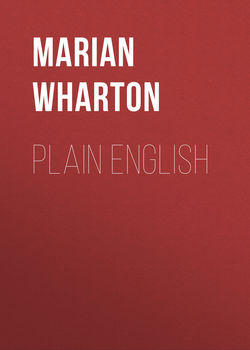Читать книгу Plain English - Marian Wharton - Страница 16
PLAIN ENGLISH
LESSON 2
THE NAMES OF THINGS
Оглавление25. What a word does determines what part of speech it is. When primitive man, long ago, first began to use words, in all probability the first words which he invented were those used to name familiar objects about him. He invented a word for man, boy, tree, animal, etc. Gradually, all the things he met in his daily life received a name. About one half of the words in our language are of this class, the names of things.
Every word which is used as a name of something is called a noun. This word noun is derived from the Latin word which means name, so it is quite the same thing as saying name. Notice the following sentences:
Boys run.
Fish swim.
Horses neigh.
Soldiers march.
Flags wave.
Flowers fade.
Girls study.
Winds blow.
Men work.
All of the words used like boys, girls, fish, horses, soldiers, flag, winds, flowers and men, are the names of objects, therefore all of these words are nouns. The subject of a sentence is always a noun or a word used as a noun. However, we may use in a sentence many nouns besides the noun which is used as the subject, the noun about which the statement is made. We will study the use of these nouns later in our lessons.
The famous palace of the kings of the Moors, at Granada, in Spain, was called the Alhambra. We have six nouns in this sentence, palace, kings, Moors, Granada, Spain and Alhambra, but the noun palace is the noun which is the subject—the noun which is the name of that about which something is said. Palace is the subject; and was called is the predicate in this sentence.
26. A noun is a word used as the name of something.
Now we want to learn to distinguish every word that is used as a name. Pick out the nouns as you read your books and papers until you are able to tell every word which is used as a noun, the name of something.
In the following paragraph, the nouns are printed in italics. Carefully study these nouns:
The fire in the grate, the lamp by the bedside, the water in the tumbler, the fly on the ceiling above, the flower in the vase on the table, all things have their history and can reveal to us nature's invisible forces.
Exercise 2
Underscore every noun in the following quotation:
The whole history of the earth has been one of gradual development, of progress, of slow and painful climbing through the ages. Not only have the hills and the mountains, the rivers and the stars, the trees and the cattle, the beasts and the birds, been developing; but man himself—his mind and his body—has been developing. Men are marvelous little creatures; they have weighed the sun in their balances, measured the stars and analyzed the light and beauty of the rainbow; they have sounded the depths of the ocean; they have learned how the sun and the mountains were born and the rivers were laid in their mighty beds; they have learned how the seas became salt, what the stars are made of. They have learned so much, and yet when it comes to matters of time and space, and law and motion, they still know so little. The only man who is conscious of his ignorance is he who has learned a great deal.—McMillan.
